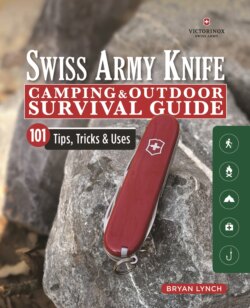Читать книгу Victorinox Swiss Army Knife Camping & Outdoor Survival Guide - Bryan Lynch - Страница 53
На сайте Литреса книга снята с продажи.
ОглавлениеKeeping Your Mind Busy and Your Morale Up
You could say that every day is a kind of survival situation: busy schedules, meeting critical deadlines, caring for loved ones, juggling home and work life. We can plan to some degree on how to cope with this daily stress. More intense survival or emergency situations away from home can take us by surprise. To prepare for the unexpected in the wild, do what you can now to plan for a happy ending.
When a very stressful situation or emergency arises, you can easily become overwhelmed: physically, mentally, and emotionally. I am clumsy on a good day, so during an emergency I am probably going to be tripping over myself. Mistakes are easily made when our body and mind are fatigued. It is extremely important to remember to rest and not overwork yourself when you’re facing an emergency situation. On the flip side, being stagnant can be just as dangerous. A friend once told me, “Waiting can be a disease.” When I am slowing down more than I should, I try to remind myself of these things.
During an emergency, our gadgets may not work, and the batteries certainly won’t last forever. Here are a few things that you can do to stay productive but also relaxed during a stressful situation in the wild.
“The earth has music for those who listen.”
—William Shakespeare
Write It Down
A writing utensil may not be on most people’s outdoor survival plan radar, but having one can give you a significant advantage. And paper can have a ton of different uses besides just writing on it. Plus, the batteries in your gadgets are not going to last indefinitely, so having something else to do can cure boredom. The SwissChamp comes with a ballpoint pen that can help you clear your mind by writing or even just doodling.
Besides curing boredom, the most important aspect of having a writing utensil is that it will allow you to document your journey. There are many important things that we may overlook or forget about if we don’t record them—where you have been, for instance. Having eyes on the ground will give you more information than a map will. So recording landmarks or helpful information, such as an old bridge or cabin or game trail, will help if you need to backtrack.
When we are thrust into situations that take us out of our daily routine, it is easy to become overwhelmed. It’s important to set daily goals in order to keep motivated and to keep the end result in sight. Making lists is a helpful way to slow your mind down, leave yourself reminders, and organize priorities. I love making lists and crossing out the items that I have completed. It’s a morale boost to see that I’ve accomplished something, and it encourages me to stay productive. The feeling of satisfaction is worth a lot in a stressful situation.
What plans or techniques worked and what didn’t work when you faced trouble in the wild? Write it down. Experience is the best teacher. Usually if I do something once, I remember how to do it. But that is not always the case as I get older. Being able to look back in my journal and see how I started a fire the day before is a good resource to have.
Speaking of resources, keeping track of resources and their location is incredibly valuable. No matter what kind of situation you find yourself in, it is important to note resources when you come upon them. You may find an area that has a good water supply or abundant wildlife signs, but it may not be a good place to set up camp. Knowing how to get back to that area, and where resources are located, can save you a lot of time. Again, if you have to backtrack, knowing where resources are will help in planning your route. All this information can be helpful reminders down the road when your mind is preoccupied with more pressing concerns.
Using the pen on the Signature Lite model to take notes in my field journal—and I may be doodling a bit as well.
Whittling
Whittling is one of those classic activities that I think most outdoorsmen try at some point. It is an activity that brings to mind an old-timer crafting a smoking pipe or some type of bird. To be honest, I don’t think it matters if you are good at it (I’m not!). What matters is the journey, the process. If it is relaxing and you enjoy it, then that is enough. When you need a few calm minutes during an outdoor trip, whittling can be the perfect way to breathe deep and consider your next steps.
I combined art with semi-functionality when I whittled a very impromptu fork. I also made a small spoon for stirring my morning coffee. In the photo you may notice the handy paracord loops I added for easy hanging. The holes were made with the reamer tool. Keep your eyes peeled for the fork to make an appearance in another project.
I have had better luck with the smaller to medium Swiss Army Knife models, such as the Tinker, when I have whittled for fun. For a more in-depth look at whittling and some great projects, I suggest Victorinox Swiss Army Knife Whittling Book by Chris Lubkemann.
I used the small blade and chisel on my SwissChamp to complete these rough-looking utensils.
